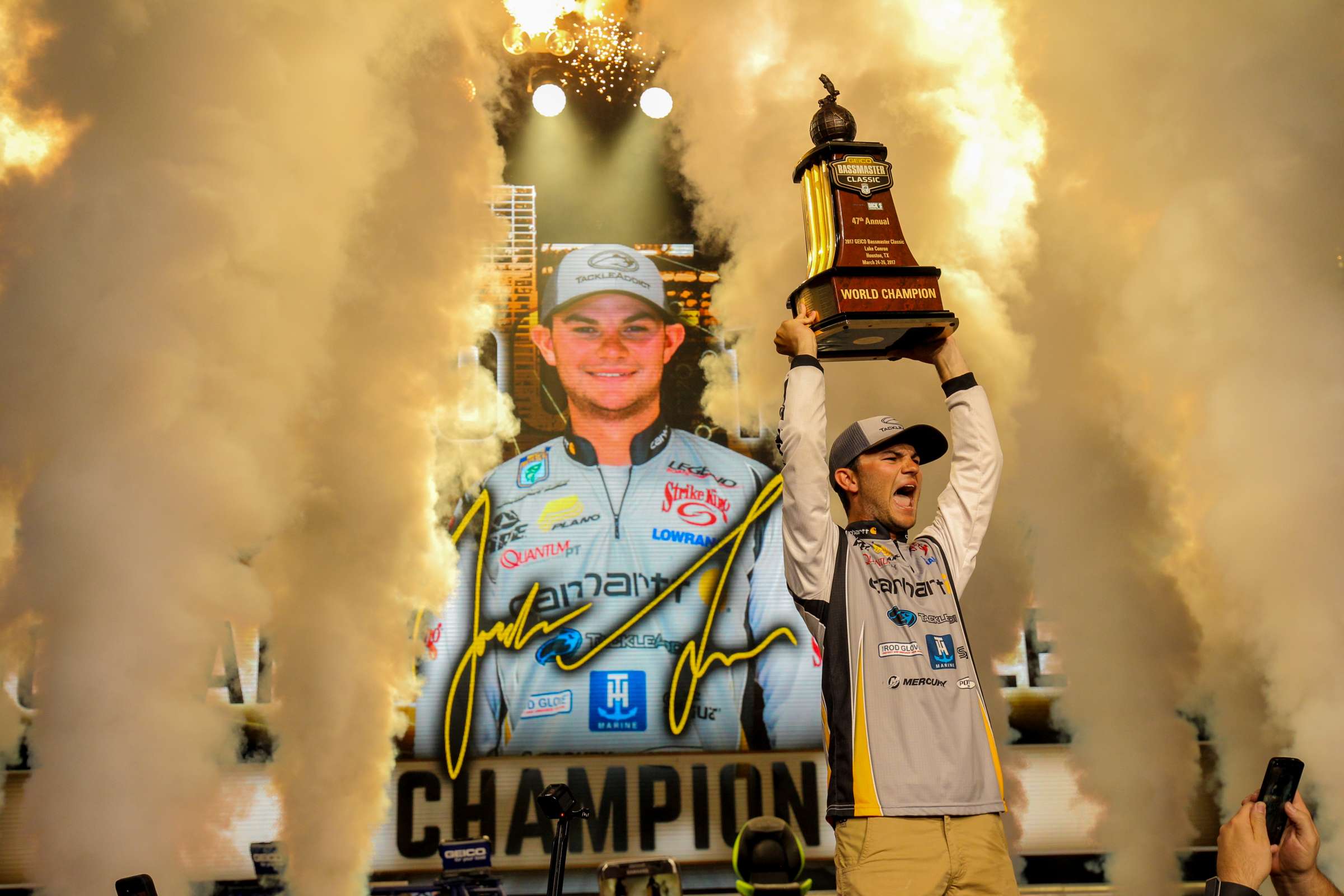
I first met Jordan Lee at the Holiday Inn bar in downtown Tulsa after the conclusion of the 2013 Bassmaster Classic, in which his brother Matt had just competed. I was transferring from a hotel by Grand Lake to one downtown and had some time to kill while waiting for my luggage to arrive in someone else’s vehicle. So, I sat down with James Overstreet and Mark and Karin Zona for a quick libation. (How’s that for some serious name-dropping?)
When I started writing this, I had to go back to the Bassmaster website to confirm that Lee was indeed legal to be in the bar, so as not to throw him under the bus. I’ve confirmed that he was of age, but I doubt he’d been shaving for more than a year at that point. He was a kid, plain and simple, but both Overstreet and Zona assured me that he was an absolute hammer.
I kind of filed that information away, but apparently it was well-known in the industry. When Jordan qualified for the Classic the next year and then qualified for the Elites, I started to hear grumblings from both anglers and industry veterans about the types of sponsorship deals that the two more or less untested brothers received. Too much, too soon, some said.
The next January, shortly before Jordan’s Classic debut, I met him at a media event in South Alabama. We spent a few hours in the boat together, caught a few fish and had a few laughs. I didn’t go there with any particular assignment in tow. It was truly a chance to get to know the anglers who were invited. As someone who doesn’t get to attend many B.A.S.S. events in the course of a year, I relish those opportunities. The more that I’m around the anglers, the more that they tend to trust me, and the more ideas and information they’ll bring to the table, which often snowballs into more assignments.
Jordan was anything but unpleasant or unprofessional at that point, but from a media perspective he was still unpolished – probably much more serious and outgoing than most of us were prior to our 23rd birthdays, but as an interviewee hardly in the class of KVD or Ike or even fellow millennial Brandon Palaniuk.
Obviously, I continued to follow Jordan’s career. How could I not? Anyone with a pulse who cares about professional bass fishing had to notice his rapid ascent. Until this past week, the most notable portion of it was the four consecutive regular season top 10s to end the 2016 Bassmaster Elite Series campaign. In fact, the last time he missed a check in any B.A.S.S. event was last April at the Bull Shoals/Norfork dual-site derby.
His angling chops were on clear display, but those alone don’t sustain a tournament fishing career except in the rarest of cases. Since the dawn of the Elite Series – the dawn of the tour, really – there have been anglers who burst onto the scene as “the next Dance/Roland/Clunn/KVD” who had the potential but not the complete dossier of talents. Some left almost as quickly as they arrived. Others just gradually faded away.
I’m fascinated by the characters who make up the Elite Series field. I watch and interact with them intermittently, and in my mind I paint a portrait of their personalities based on a time-lapse sequence of quick shots. What I could see with Jordan was that each time I met him, or interviewed him, he seemed to have become a little more confident, a little more professional and a little more polished. One thing that impressed me is that he always remembered me on sight.
That may strike readers as a case of unbridled narcissism, but let me explain – much more often, I’ve experienced the flip side of that phenomenon. I can think of Elite anglers who I’ve interviewed dozens of times, both on the phone and in person, some of whom I’ve even fished with, who likely have no idea who I am. That may be a result of the fact that they meet hundreds of people a year, but it’s also a bad business practice. Additionally, each time I interviewed Jordan, he was a little bit clearer, a lot more eloquent and a much better ambassador for his sponsors and for the sport. When I interviewed him most recently for an article on how he breaks down big new waters, his answers were of the caliber I’d expect from KVD, Ike or Palaniuk.
I have no idea if he worked to improve his interview skills or if they simply got better as the result of practice, but the bottom line is that he evolved. I’ve seen it in other anglers, too, and to drop two more names I’ll cite Seth Feider and Jesse Wiggins as two pros whose interview skills were just ok the first time I talked to them, but whose skills have improved substantially since then. It’s those pros, the ones who don’t accept the status quo in any aspect of their craft, who I expect to stick around. If you aren’t willing to work on your business, why should I expect you to be on the leading edge of the on-the-water part of the job, either?
Not every angler has the potential to be a Jordan Lee, on or off the water. Nevertheless, they all have the ability to improve at every aspect of their job. Not everyone can catch a 27-pound limit to vault from 15th place into the winner’s circle at the Bassmaster Classic, either. At the same time, I can’t help but conclude that Lee won not because of any particular fishing technique, but rather because his greatest skill is acquiring new skills.

